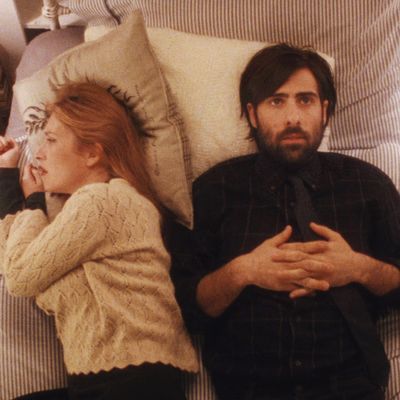
Writer-director Alex Ross Perry raises fascinating aesthetic questions in his third feature, Listen Up Philip. Can we identify with an asshole so flaming that nearly every word out of his mouth burns yet another bridge to the human race? More important: Can we even watch him for longer than a few minutes?
I wanted to watch, to identify — or at least come away with some insight into how solipsism sustains itself. The screening I caught at the New York Film Festival began with Perry effusing over the number of great movies he had seen in that venue and how thrilling it was that his own was selected. Then he went on to talk about showing up his enemies, his affect so endearing that I thought the Nixonian language was a put-on. But on the evidence of the film, it’s only half a put-on. He probably does have an enemies list. And he wants to test his audience’s loyalty the way his main character, Philip, tests the world’s.
Jason Schwartzman plays semi-famous novelist Philip Lewis Friedman, established from the start as angry, impatient, verbally abusive, and able to conjure up conflict where none should exist. He single-handedly generates a blow-up with an ex-girlfriend, stalking away from her while screaming that she tried to undermine him: “If I listened to you, I’d be nothing right now!” (She has barely uttered more than a few pleasantries.) Then he meets an old college chum whom he says hasn’t measured up to their shared dreams of success. Then he visits his agent and works himself into such a froth that he finally declares he won’t promote his new book. He is, if anything, worse with the most important person in his life, his live-in girlfriend Ashley, played by Elisabeth Moss. From their first scene, it’s clear that she either has very low self-esteem or was in too deep when the real abuse began.
We all know Philip’s type — some of us, alas, even have elements of his paranoid personality. But Perry makes him the worst of worst-case scenarios. The movie has a narrator (Eric Bogosian) who sounds like a mixture of an 18th-century moralist and Rod Serling of The Twilight Zone observing an alien life form. Maybe it would help if we heard something of Philip’s writing, if he revealed some larger perspective on his own tumultuous emotions and showed a smidgen of empathy for others. But if Perry has any opinion on Philip the artist, he keeps it to himself.
Perry’s last feature, The Color Wheel, was entertainingly unpleasant. One reason was that the co-protagonist (Carlen Altman, who wrote the film with Perry) was just as screwed up as the main guy (played by Perry), and the way they verbally flayed each other gave the film real drama — and a sort of tenderness. There’s no tenderness in Philip’s alliance with an avuncular (though self-serving) writer named Zimmerman (Jonathan Pryce), obviously modeled (duh) on Philip Roth. Zimmerman offers Philip a place in the country to work. He counsels him on his public persona: “Don’t make being lackadaisical and disorganized your thing.” But the relationship doesn’t build to anything. And the women who flit in and out of Philip’s life (among them Krysten Ritter, Dree Hemingway, and Kate Lyn Sheil) leave no residue. He does show a fleeting fondness for his uncle (the ever-likable Lee Wilkof), but the character is in and out too fast to register fully.
Whenever Perry focuses on Ashley’s crash and slow recovery, Listen Up Philip becomes halfway human, in part because Moss is an expert at delineating shades of pain, everything between gray endurance and black despair. Schwartzman is nowhere so skilled. He has played self-centered twerps before, but this time, he shows us nothing more than an angry mask, and as close as Perry’s camera homes in (it’s ultraclose, handheld, scrutinizing), there’s nothing to see. Toward the end, Philip is forced to face up to his aloneness in the world, but the only surprise is that it took so long. There’s an instant of childlike confusion in his face — and then it’s back to being a creep.
I know there’s a kind of obviousness in the complaint that the protagonist is an unrelenting asshole when every character says — when the whole point of the film — is that he’s an unrelenting asshole. But a central figure who’s all bad is even more boring than one who’s all good. He has no dramatic stature. He’s a case study. The audience should be paid to listen up.





